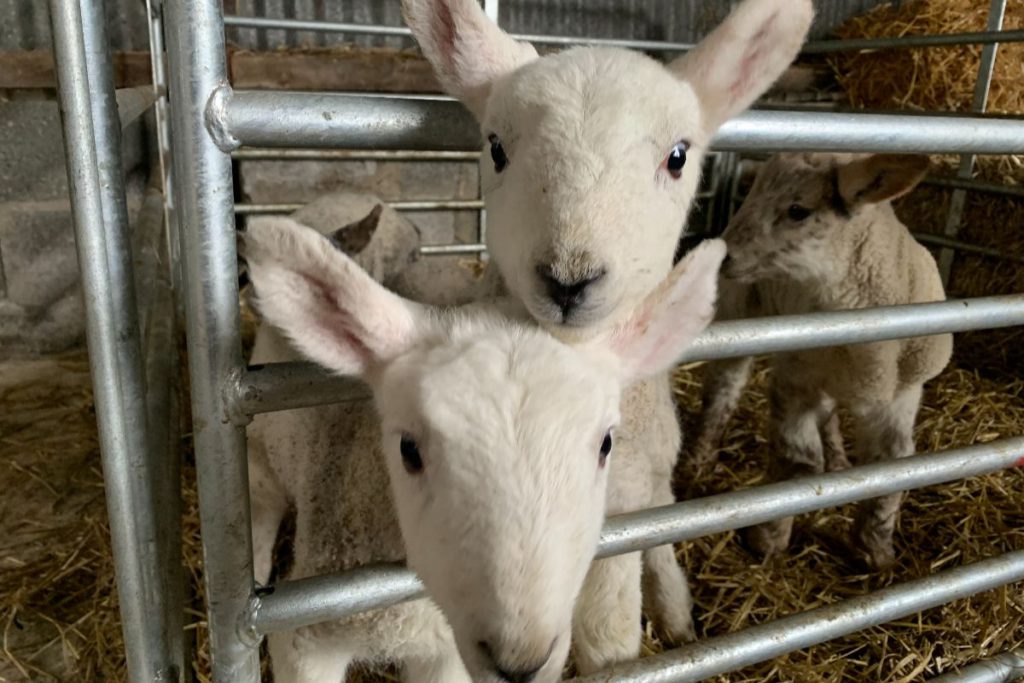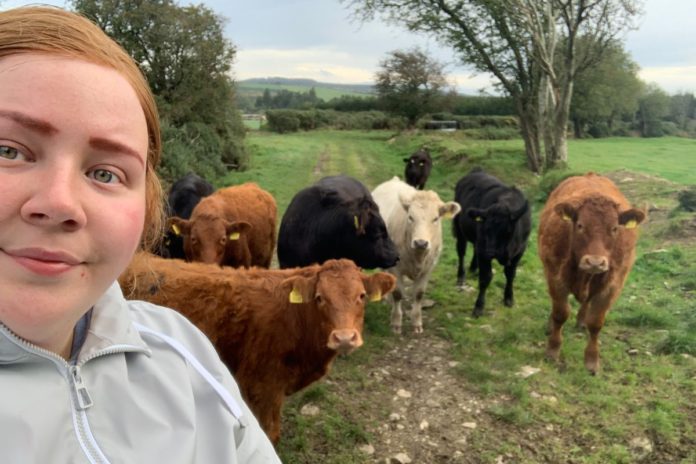In this week’s women in ag segment, we speak to Wicklow mixed farmer, Emer Molloy. The student and The GAP Kitchen employee explains how the Covid-19 pandemic triggered a newfound passion for her family’s sheep and suckler farm.
“I fell in love with the farm during the first Covid-19 lockdown two years ago.”
Those are the sentiments of Emer Molloy, who claims that this experience has changed her entire perspective on her future endeavours.
The 23-year-old currently assists with running her family farm, is a part-time third-level student, and is a full-time employee at The Gap Kitchen.
The Ballinastoe, Roundwood, Co. Wicklow native told That’s Farming editor, Catherina Cunnane:
“Farming has always been in our family, with my brother and I being the third-generation on the home farm.”
“I always loved the farm, animals especially. When I was younger, going out with dad was always fun, whether it was looking after lambs or standing in gaps.”
“However, two years ago, I would have never seen myself leaving work and heading home to put my wellies on,” she laughed.
Wicklow mixed farmer
The family operate a sheep and beef enterprise along with purchasing store lambs for slaughter.
In total, they have 230 commercial ewes, 6 rams, approximately 250 store lambs and a suckler herd comprising 9 cows, 17 weanlings and 1 Limousin stock bull.
Emer and her brother, David, work full-time off-farm, assisting their father, Patrick, and uncle, Peter, when required.
Their flock consists of Wicklow Cheviot, North Country Cheviot, Suffolk-cross and Texel-cross ewes with a team of North Country Cheviot, Suffolk, Charolais, Vendéen and Texel rams.
The family have a spring lambing flock that will start to lamb after St Patrick’s Day next year.
They intend to scan ewes in early January to determine how many lambs they are carrying, allowing them to separate the ewes accordingly. Furthermore, they start to feed extra concentrates about six weeks pre-lambing along with silage.
They lamb outdoors, bringing twins and triplets in for up to two nights and weather dependent, aim to leave single lambs outdoors and move them to fresh pasture, with dams, after birth.
“Having Texel and Suffolk ewes, we usually have a fairly high rate of triplets every year, bringing some problems.”
“Any surplus lambs are usually adopted onto single ewes or those who have lost lambs. In the last two years, I have raised two batches of pet lambs, keeping the ewe-lambs to start my own little flock.”
“I love the little pets; they have their own personalities and become a part of the family in some ways. However, even though they can be high maintenance, I know my dad and brother secretly love them too,” she laughed.
They breed their own replacement ewes – North-Country Cheviots, Suffolk-cross and Texel-crosses – on the farm, keeping 60-70 replacements every year and lambing these at 24-months.
For the summer months, their hogget-ewes, ewes and ewe lambs graze the commonage of Djouce hill of the Wicklow Mountains.
All other lambs remain home to fatten for the factory. They operate a farm to factory system for the rest of their lambs and occasionally sell a batch of Suffolk-cross ewe lambs Blessington Mart.
In August/September, they purchase approximately 200 store lambs for the winter in the hope to have sold all lambs to the factory by spring.
They are generally 35-40kgs live when purchased, and the family aim to sell these to ICM Camolin, Wexford, when they are around 50kgs live weight.

Responsibilities
“During lambing season is where most responsibilities lie. With ewes lambing and cows calving, there are still the daily tasks that we need to do too.”
“I am very passionate about sheep; breeding high-quality ewes is very important to the future of the flock.”
“Having good quality ewes and hoggets is vital for our system because we are keeping their lambs for replacements or for the factory.”
“This year, we are breeding Texel ewes with the Suffolk ram to get a new replacement breed into the flock. Also, I have kept a couple of my pet lambs to breed this year which are Charolais and Vendéen. I am looking forward to the lambs they produce.”
Furthermore, she also weighs and monitors store lambs’ progress as part of a progressive production system.
They move lighter lambs onto fresh after-grass and do not feed them concentrates until they are in the region of 45kgs.
They do not slaughter lambs until they are approximately 50kgs and have what she regards as “a nice fat cover”. The young farmer records live weights and compares this data with factory kill-out results, which “always has a few surprises”.
Along with this, she assists her father with all background paperwork, animal transfers, scheme applications, and Bord Bia Quality Assurance Scheme requirements.

Suckler farming
On the other hand, the family’s cows – a range of cross-bred females: Aberdeen Angus, Charolais Limousin and Shorthorn – calve from the end of January onwards. The breeding season commences in March/April, with a five-star Limousin stock bull being their sire of choice.
“The bull is only in his second year on the farm. Having a new bull is always a worry, but the calves off him last year are great and are all very docile,” she remarked.
“Pre-calving, we keep cows and heifers altogether in a slatted unit on one of the out-farms. We will bring them home shortly before they calf.”
The family keep weanlings for the winter period and usually sell these in spring as yearlings at Carnew Mart.
Besides, they recently purchased three pedigree Shorthorn heifer weanlings to keep as replacements for the future and also bucket reared 6 dairy-beef Limousin calves.
“I enjoy being outside in the fresh air and caring for the animals. I am not too fussed by machinery or anything, but anything involving the animals I love.”
“Making sure they are thriving and in good health is always the priority for me. Happy livestock = happy farmer,” she added.
“Farming is also a great way to focus your mind; being busy and away from social media and the worry in the world is always a bonus. Spending time with my dad is great; we have a great relationship, which farming together enhances.”
“Also, I am in the middle of training my little collie pup, Lass. Although it is challenging, seeing her grow and develop is very rewarding. It gives me some extra freedom to do jobs around the farm.”

The GAP Kitchen
The IT Carlow business management student works at the GAP Kitchen, a café within Glencullen Adventure Park in the Dublin Mountains. The GAP is a mountain biking park along with walking trails that are part of the Dublin Mountain Way.
They serve coffee and treats along with an extensive hot food menu which has their famous 100% Irish beef burger.
She moved to fill the position of kitchen manager in 2017 and is responsible for the café’s daily running, serving customers and stock purchasing.
“I work Wednesday – Sunday from 8-6.30pm. Food is prepared fresh, and customers are always around, so there is never a dull moment. Previously, I worked in my local Centra throughout school.”
“It is nice to have a responsibility and to see a business grow daily. Sometimes it is hard being away from the farm, especially during busy times.”
And while “there may not be enough hours in the day” for this 23-year-old, she “likes the fact that no day is ever the same”.
Being a farmer, kitchen manager and student, you “never know what you could end up doing throughout the day”.
“There are no monotonous 9-5 days; every day is exciting,” she added.

Women in ag
During the interview, she reflected on her experience as a woman in the industry to date.
The Wicklow mixed farmer explained that she has not directly been mistreated within the industry, but “there is a gap”.
“I think that women are not the first option when it comes to agriculture and farming. Women are just as able-bodied and able-minded as men, especially with new technology in comparison to years ago.”
“There is no need to be a ‘strong man’ to farm; us women are just as able,” she added.
“I think encouraging young girls to go out and explore farming and the countryside is a must. It is such a great experience that many may not know they would love.”
“Furthermore, I think women need to stick together to help encourage others, be confident in their work and not be afraid of anything – the situation can only improve from here.”
The Wicklow native explained that her family supports her and encourages her in her endeavours in the field “where possible”.
“I do not find it too tough. The stereotypical farmer is becoming a thing of the past. I hope to graduate next summer. Then, I hope to go on to get my Green Cert and see where that takes me.”
“Being a woman in agriculture is probably the best thing to happen to me. It has guided me to a path I never thought I would be on, along with supporting my family too.”
“For women, our involvement in agriculture can only get better and be more recognised than before,” the Wicklow mixed farmer concluded.
See more women in ag profiles.
To share your story like this Wicklow mixed farmer, email – [email protected]





